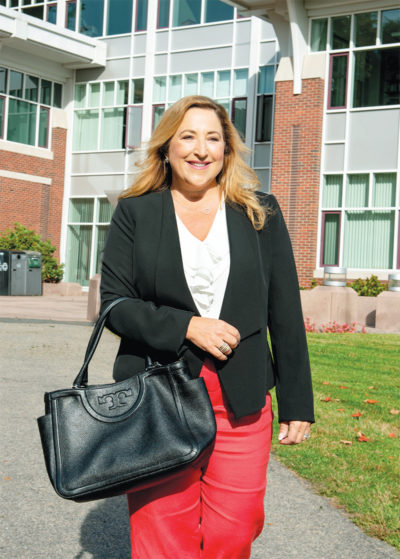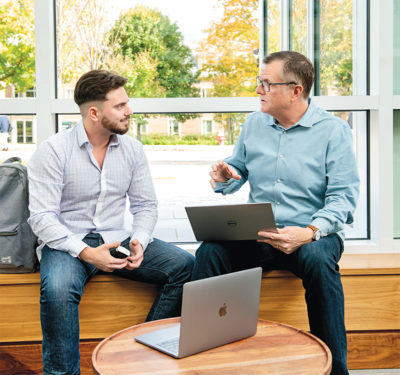
Photo: Michael Quiet
At Babson, wisdom comes from seasoned professors, of course, but it also stems from thoughtful mentors, many of whom turn into trusted friends.
These guides typically are Babson graduates who have achieved success in their fields and are eager to give back. In turn, the relationships they develop with students add a rich layer to their own professional development.
Take Hugh Glazer ’77, P’13. He spent the early part of his career as a certified public accountant, working at the New England Journal of Medicine and Simon & Schuster. Today, he runs the WinterView Group, which provides CFO services to private companies and nonprofits.
He also is a business advisor in the 10,000 Small Businesses Program, a joint venture between Babson and Goldman Sachs. The program, which provides access to education, capital, and business support services, is “a 13-week business bootcamp for CEOs,” he says, many of whom are trying to grow their families’ small businesses.
He reflects on a young woman who was overwhelmed by taking over a family business from her parents because she’d never had an active role in it. When Glazer suggested a change, she said, “Are you really going to give me permission to do that?” It was a watershed moment for the nervous entrepreneur.
“I said, ‘It’s got nothing to do with me! You have to give yourself permission.’ This is how a mentor can help someone—be a sounding board.”

Dana Harris MBA’91 is on campus regularly for mentoring and guest lectures.
Photo: Webb Chappell
Glazer serves as a coach through Babson’s Coaching for Leadership and Teamwork Program (CLTP), which provides undergraduates with one-on-one developmental coaching on their leadership, communication, and interpersonal skills early in their careers. He has been involved with the program since its inception, brought along by Professor Joe Weintraub, CLTP founder and faculty director, a longtime friend and mentor. In his session of the program, roughly seven students participate in a two-hour case study that they’ve never seen before, receiving real-time feedback from seasoned coaches such as Glazer. Students participate in their first year and again as juniors or seniors, sharpening their analytical skills.
“This is one of the programs that have drawn accolades for Babson,” he says. In addition, his work with students and other coaches has changed his outlook.
“Oftentimes, you might make a snap judgment. ‘Gee, wow, this person is going to be tough to work with.’ And, once you get going, you find out they have all kinds of insights. So, for me, the CLTP program over the years has really taught me an awful lot about managing people, interacting with people, and how to just judge people on what they say and do, so to speak, versus what your visual cue might sometimes say to you,” he says.
Professional Gratification
Dana Harris MBA’91 is a partner at Red Javelin Communications, a boutique PR and marketing agency, focusing on technology and industrial companies. She is a longtime B.E.T.A. (Babson Entrepreneurial Thought & Action®) competition judge through The Arthur M. Blank Center for Entrepreneurship, as well as a regular mentor and a marketing guest lecturer. In April, she was an advisor in the Mega Mentoring session at the Founders Summit centennial series of workshops. There, 100 alumni matched with 100 student entrepreneurs for discussions. Harris consulted on brand messaging and marketing.
“You almost feel like (the participants have) full-fledged companies, but they’re students. They’re doing double time over at Babson,” she says, laughing. “It’s unbelievable and so impressive—not something I could’ve been doing back in my day.”
She recalls meeting with Ryan Lupberger ’18, a founder of CleanCult, a subscription service that aims to deliver effective, nontoxic laundry pods. Seeing her direct mentorship provide real results for Lupberger’s team was a rewarding experience, Harris notes.
“They wanted to pursue similar branding to a competitor and wanted tips on how to do that. I was able to provide advice on how to use content to create relationships with customers—how to use video, SlideShare, social media, and blog posts—and give them advice on their brand voice. This company went on to win the B.E.T.A. Challenge and the MassChallenge, which are two very prestigious startup competitions in the Massachusetts area,” she says.
“Seeing someone else take my advice and then applying it was so gratifying—and it validates my own education. I felt that it made my experience valuable in a way it never did before. I’d say that is the one thing that I really love about mentoring: It gives me a newfound sense of responsibility and achievement in reaching a career milestone where I’m able to help people and give back.”
Learning From Students
Chris Jacobs ’10, meanwhile, brings his entrepreneurial talents directly to the classroom. As the founder and CEO of Honest Discounts, a company that provides savings on prescription drugs, he has regularly taught Professor Len Green’s Ultimate Entrepreneurial Challenge class. (Bloomberg Businessweek named Jacobs one of America’s best young entrepreneurs in 2009.)
Jacobs calls Green the “Obi-Wan Kenobi” of Babson. “He’s the ultimate mentor,” Jacobs says, noting that he was honored to be a guest lecturer.
“It’s a long-running class, and it fills up right away. It’s an amazing experience. … Everybody wants to take it. All the (students) who want to build companies want to take it,” he says.
Jacobs presents case studies from his company without disclosing its name, allowing students to present their ideas. Then, he tells them what actually happened and grades each presentation. Mentoring these blossoming entrepreneurs has helped him think about his business in different ways, he notes.
“When you teach someone something, it really forces you to think about what you’re saying and how to articulate it,” he says. “When I start talking about a sales operation strategy or I come up with an idea for a student, a lot of times I think, ‘I should be doing that myself!’ Just through talking about the student’s problem and how I would solve it makes me a better problem-solver.”

Dillon Galynsky ’20 talks to his mentor and friend, John Grayson MBA’97, P’20.
Photo: Webb Chappell
An Enduring Relationship
Sometimes mentorship results in a long-term friendship. John Grayson MBA’97, P’20, executive vice president of Agbotic Inc., met student Dillon Galynsky ’20 through the Babson Summer Venture Program as Galynsky launched HUSH, a smoke filtration device that eliminates fumes and odor, captures ash, and reduces secondhand carcinogens.
“Business success is often measured in dollars and cents, but a successful mentor-mentee relationship produces a meaningful and long-lasting impact at a personal level,” Grayson says. “That’s hugely rewarding for both the mentor and mentee.”
“We just hit it off,” recalls Galynsky. Grayson took an interest in him as a person, not merely as an entrepreneur, he adds.
“We ended up meeting outside of Babson and spending more time together. It first started from a mentorship capacity, and then it grew to a friendship, which is very important because there’s a level of trust that evolves over time. I’d call John and ask him questions about my life that didn’t even have to do with the business,” he says.
For mentors, the end goal—seeing students succeed—is as fulfilling as their own careers.
“Babson has been able to turn out fabulous students who are just so entrenched in taking their education, what they’re learning in the classroom, and bringing it into the real world and applying it in companies in ways I’ve never seen before,” says Harris. “It’s amazing.”
